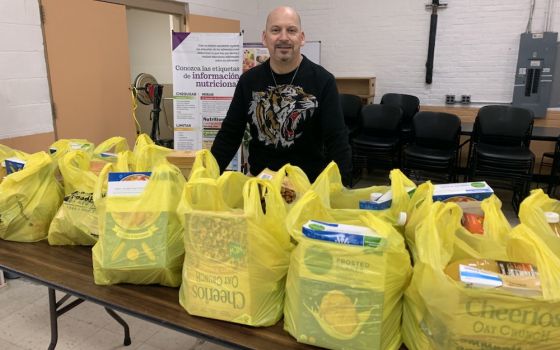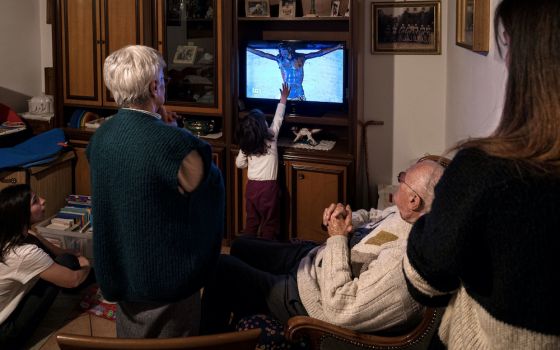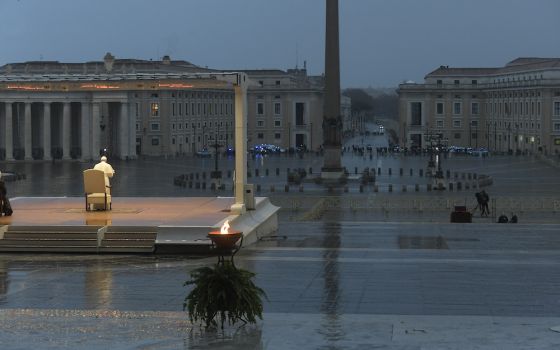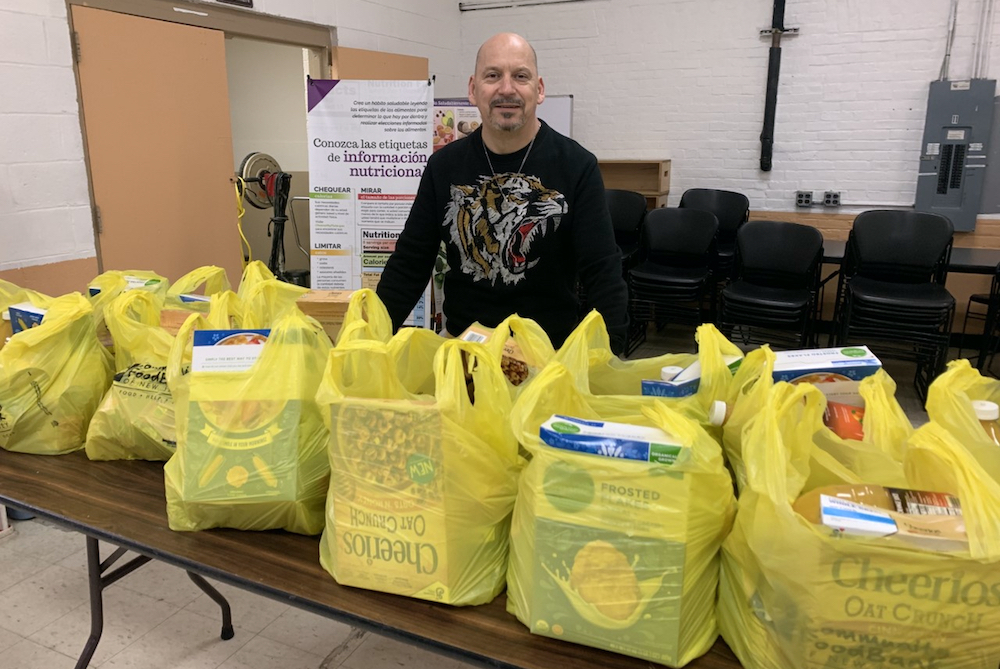
Carlos Roldan, director of Catholic Charities, Diocese of Paterson, New Jersey, Food Pantries, is shown with pre-packed bags of food March 23 ready to be distributed to people impacted by the coronavirus pandemic. (CNS/Courtesy of Catholic Charities the Diocese of Paterson, New Jersey)
Catholic parishes across the world are closed. Millions of Catholics have been unable to physically take part in the celebration of the Mass for weeks, and may not be able to again for months.
Simply put, the coronavirus pandemic is fundamentally changing how we do and be church.
What could these changes mean for us in the long-term? How will they affect us in the years to come, well after the initial threat of the pandemic has passed?
Over the past week, NCR surveyed two dozen theologians, social directors, non-profit leaders, and pastors, asking them each to consider these questions. We're presenting the answers over three days.
Previously, we focused on questions of community and church governance. Today we turn to the church's social mission.
Beyond our own shores
Sean Callahan is president and CEO of Catholic Relief Services, the official international humanitarian agency of the Catholic community in the United States.
In January, I rode with Yayah Kamara from Kabala, in northern Sierra Leone, to the capitol, Freetown. Kamara is the operations manager for Catholic Relief Service programs in this area. He is an unassuming, quiet man, but if you watch him closely you know he is analyzing everything and is always ready to respond.
In 2014, Kamara was a first responder when the Ebola outbreak wracked Sierra Leone, Guinea and Liberia. He would leave his family each day, knowing that he was putting their lives at risk. He and his team put on their personal protective equipment and "collected" the sick and/or dead.
Instead of being attacked by locals, as some responders were in other communities, Kamara's team was welcomed into their homes. They advised family members of the proper Ebola protocols; they treated Ebola victims with dignity and respect; and they performed safe and dignified burials to allow families to say goodbye without risking infection.
I wanted to spend time with Kamara because I saw him as someone who exemplified the church's social mission by putting his community, his country and even me (far away from Sierra Leone in the United States) over himself and his family.
The church's social mission becomes more evident and more dramatic during times of crisis. We see those who continue to provide food, healthcare and homes; and those who call for justice; and those who call for peace, as the prophets of our time.
These crises unite us as we get a glimpse of some of the challenges and uncertainties millions of people face every day. We are called to act in solidarity. The common good requires us to constrain our desires and our freedoms when they poignantly and directly hurt others.
The blessing of COVID-19 may be that it allows us to see beyond our own wants and needs to those of others less fortunate. It may allow us to foster a "one health" approach and heal our Mother Earth, and it may allow us to look at our sisters and brothers from other countries and cultures as a source of inspiration and leadership. It is time we open ourselves to a world beyond our own shores and egos.
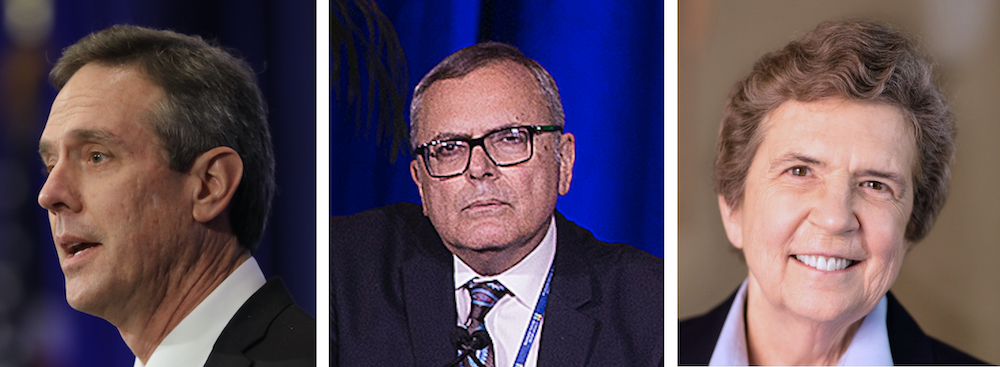
Sean Callahan, president and CEO of Catholic Relief Services (CNS/Bob Roller); Richard Coll, executive director of the Department of Justice, Peace and Human Development at the U.S. Conference of Catholic Bishops (CNS/Tyler Orsburn); Daughter of Charity Sr. Carol Keehan, former CEO of the Catholic Health Association of the United States (CNS/Courtesy of Catholic Health Association)
New forms of pastoral care
Richard Coll is executive director of the Department of Justice, Peace and Human Development at the U.S. Conference of Catholic Bishops.
The Holy Father emphasized in his apostolic exhortation Querida Amazonia ("Beloved Amazon") that our environment, our culture, our economy of exclusion and our survival as humans and that of many species are all interrelated. We only need to look to this current health crisis and our response to see that the standard path for dialogue and advocacy has now changed.
From distance learning and business conducted over web-based video meetings and teleconferencing, to our socializing behavior, our response may provide new opportunities to reflect this interconnectedness and to advocate for creative responses.
The recent Synod of Bishops highlighted the need for new missionaries to bring the Gospel to the far corners of the Amazon, but one need not travel far to find in our own country vast areas of territory not adequately served by pastoral personnel or resources.
The Holy See's use of technology to bring the pontiff's March 27 Urbi et Orbi blessing directly into the homes of the faithful is the most recent guide in applying foresight using the techniques of telecommunication to continue to shine the light of Christ in times of crisis when people are prone to despair.
Technology should enable us to reach out and advocate, both lovingly and effectively, on behalf of large portions of our faithful — Pope Francis' beloved peripheries — that previously have been ignored and underserved. It may take a new Marshall McLuhan to realize the best medium for these messages, but we must begin boldly today to craft the new forms of discourse that must be made available in this new pastoral climate.
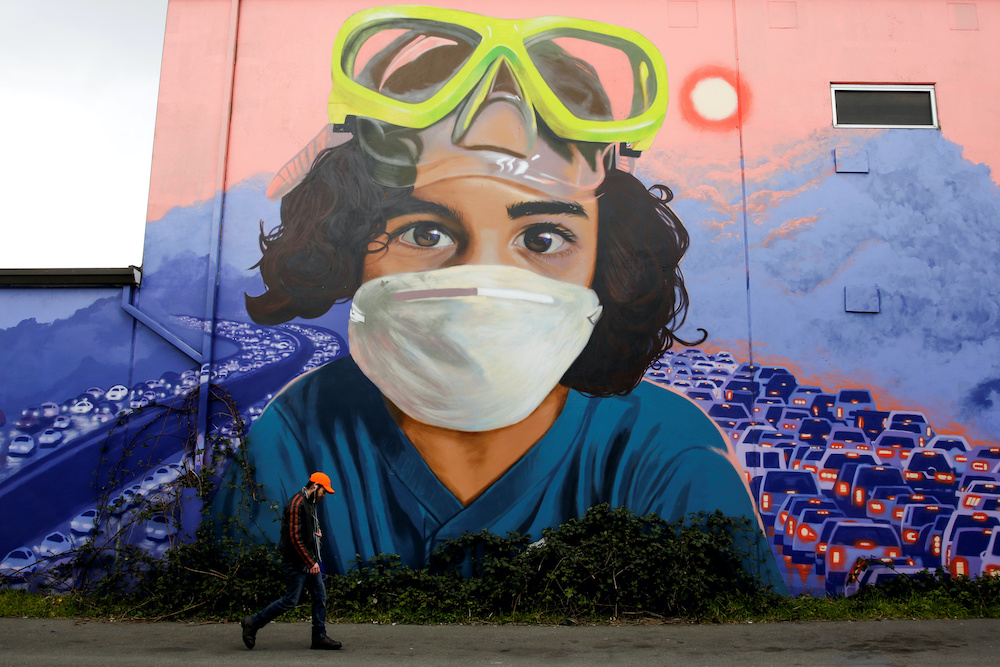
The mural in Seattle is seen during the coronavirus pandemic March 24. (CNS/Reuters/Jason Redmond)
Value of ministry made clearer
Daughter of Charity Sr. Carol Keehan is the former CEO of the Catholic Health Association of the United States.
In the middle of this dangerous and frightening pandemic, it is a good mental health exercise to think about life after it is under control. In every aspect of our lives we have experienced massive changes, uncertainties and loss of control. What will the "new normal" be?
The church's ministries have experienced radical changes and challenges: from schools that had to go to complete distance-learning instantly, to finding ways to get college students home from the ends of the earth, to our healthcare facilities that had to ramp up capacity to treat large numbers of patients with a disease we don't understand, to protecting caregivers from being infected before we understood how the disease is transmitted, to coping with huge shortages of supplies and equipment to protect both patients and caregivers. Especially challenged ministries were our nursing homes.
What will be our "new normal" state? I think the value of church ministries will be much clearer. The heroes in them will be remembered and celebrated. The importance of a better national system for dealing with these emergencies, run by experts in their field and well-funded, will be demanded by the public. The impact of the failures in this pandemic and how they crippled local responders will drive this initiative.
It will be imperative that the massive financial impact this has had on these ministries as they struggled to keep up their service and protect students, patients and staff is recognized in the priorities of future congressional stimulus bills. These ministries are a treasure in their communities and deserve support to sustain and rebuild them as much as public corporations.
I think you will also see these ministries being a very informed and convincing voice in the public square on the impact of the pandemic on those they serve and how that should be prioritized in stimulus bills. This advocacy will be another important way the church serves.
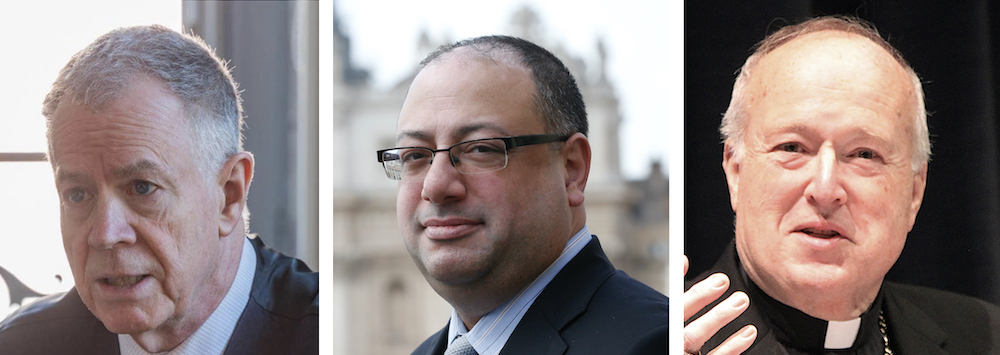
Jesuit Fr. James Keenan, vice provost for global engagement at Boston College, a theologian and the founder of Catholic Theological Ethics in the World Church (Jesuítas Portugal/João Ferrand); Eric LeCompte, executive director of Jubilee USA (CNS/Paul Haring); Bishop Robert McElroy of San Diego (CNS/Courtesy of the University of San Diego/Ryan Blystone)
Health for all, not 'the many'
Jesuit Fr. James Keenan is the vice provost for global engagement at Boston College, a theologian and the founder of Catholic Theological Ethics in the World Church.
At the end of Albert Camus' The Plague, the remarkable Dr. Rieux realizes that as the plague recedes, the survivors will honor their dead and return to normal life as if nothing happened, even though the virus could come back anytime.
Today we face the fragility of life so immediately that at times, like the virus itself, we are left breathless.
And we face the mortifying frustration of being unprotected: lacking the tests, masks and ventilators; these life-savers were not in our reach.
When it recedes, what can the church do to help us to learn from these experiences?
Consider this. Many of us are experiencing a pandemic for the first time, yet others have known the ravages of malaria, tuberculosis, maternal and infant mortality, AIDS, Ebola — the lists goes on. Likewise, they know that treatments are there, but not within reach.
We have kept those illnesses from our doorsteps for years, but not from theirs. Unaffected, we could live with news of their struggles.
Can we now? Now that we know the terror of a pandemic and the tangible alienation of lacking available resources, can we return to our old ways of living with news of their struggles?\
Could our churches make us more mindful of health for all? In Latin, health is salus, the same root as salvation. Could the bishops make us realize that when it comes to health or salvation, it's not for the "many," but for all?
A more resilient world
Eric LeCompte is the executive director of Jubilee USA, an alliance of U.S. organizations and faith communities that advocates for fair debt arbitration and debt relief.
Under a strict coronavirus quarantine and curfew across Puerto Rico, the 3.5 million residents of the Caribbean island continue to experience earthquakes and struggle to recover from 2017 hurricanes. A debt crisis had already shuttered schools and health services in the U.S. territory, where almost 60% of kids live in poverty.
Increasing services for the poor and sick as the coronavirus spreads is Caritas Catholic Charities Puerto Rico. Caritas' parish-based groups and their coordinator, Fr. Enrique "Kike" Camacho, and his team find people that need help. Then, Caritas parish-based groups across the island are deployed, risking their lives every day to bring food and medicine to those in need in barrios, under bridges and in public squares.
As the global coronavirus takes lives and wreaks havoc on our economy, the church and the faithful are on the front lines. Offering up their lives to save us across our planet are Catholic sisters and nuns and the incredible health institutions they founded. Catholic Charities, Caritas and Catholic Relief Services are expanding their services to the vulnerable at this moment. Diocesan soup kitchens and Catholic Worker Houses, while being more flexible in how they deliver food, are quickening their pace to get the food to the people who need it most.
The Holy Father proclaims that lives, in this tragic moment, must not be sacrificed for economic growth — that if we prioritize wealth for a few, we will witness a "viral genocide."
The sad truth about this crisis is that if the social teaching of the U.S. bishops' conference and the Holy See had been heeded by world leaders, both our economic and healthcare systems would have been better prepared for the pandemic.
When asked what this plague means for the social mission of our church, the response is that in times of crisis the social mission of our church becomes more vibrant, more vital and most true to the call of the Gospel.
As the International Monetary Fund said March 28, we are in a recession and we risk a financial crisis graver than the Great Depression. It will be the social mission of the church that illuminates a path towards a more resilient post-pandemic world.
Advertisement
An outward-facing church
Bishop Robert McElroy leads the Diocese of San Diego, California.
The most powerful dictum of reflexive pastoral action in the life of the church says: "Why do we do it this way? Because that's how we have always done it."
But in these days of pandemic and social distancing, that dictum has been shattered, at least for a moment. Parishes, schools, dioceses and social service agencies are attempting to carry out their missions in a vastly transformed culture in which we cannot wait for men and women of faith to come to us and our churches because it is impossible for anyone to come. Every single pattern of pastoral service, sacramental life and the proclamation of the Gospel has to be rethought and reconfigured in a radical manner.
As a diocesan bishop, I have been amazed by the energy, creativity, optimism and resilience that have emerged in the collaborative action of priests, lay leadership, pastoral staffs, school communities and religious women and men. Faced with the searing deprivation of direct sacramental encounter and community necessitated by the demands of public health, the Catholic people are imagining dramatically new pathways of participation in the most important elements of the life of the church.
The majority of pastors are inviting the laity to be architects of this reimagined pastoral life, because they recognize that so many instruments of effective evangelization and sacramentality in this COVID-19 era involve modes of communication in which a parish or school's lay leadership has both the technical expertise and the understanding of what will truly benefit the community of the faithful.
At the heart of this transformation, a new momentum is building for a church that is actively outward facing rather than rooted in the sacristy. Pope Francis' vision of energized missionary discipleship is truly taking root.
Yet the most important question we face is this: When that joyful day returns on which we can fully participate in the sacramental and community life of the church, will we carry with us from this moment only the mechanics of new pathways of communication and ministry, or also the deeper mandate that we as a church must become piercingly outward facing and missionary?
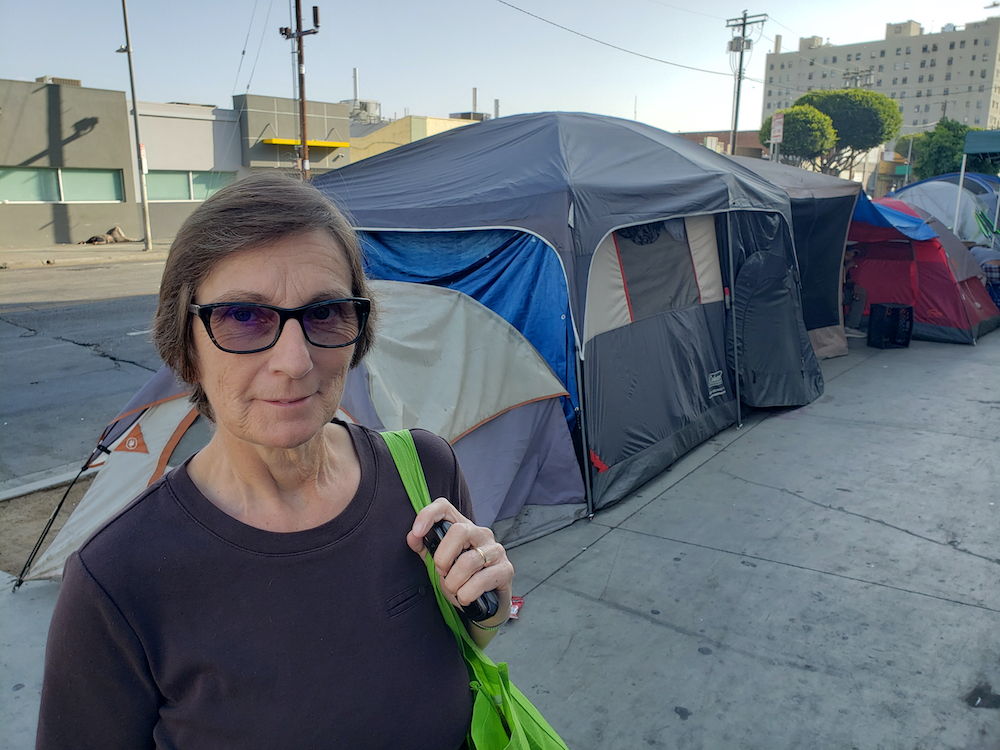
Sr. Margaret Farrell, a member of the Religious Sisters of Charity, is spiritual ministry coordinator at Covenant House California in Los Angeles and a frequent visitor to the streets of Skid Row in the city's downtown area. (GSR file photo/Chris Herlinger)
Prioritizing people in need
Joan Rosenhauer is executive director of Jesuit Refugee Service USA.
Around the globe, we watch with admiration and gratitude those serving people in need of health care and contributing to the common good through essential services. At Jesuit Refugee Services USA, where most staff can telework, chaplains are providing pastoral care for people detained by the U.S. government, going into centers when others can't so detainees have support.
After the coronavirus pandemic, the church may experience changes in three areas: Catholic priorities, technology and advocacy.
This lesson about who matters — those in need — and whom we admire — those who serve — can have lasting impacts on the church's social mission. I am hopeful, going forward, the church's ministries serving those in need will become more valued and widespread in the life of the church.
The pandemic is also causing charitable organizations to implement new technologies. Along with emergency care, mental health services are central to current JRS programs. Families forced to flee their homes suffer terrible trauma. With the pandemic, our staff use cell phones and other technology to ensure that mental health support continues safely. In the future, our ability to use technology to connect refugees to digital services and the digital economy will overcome the limitations of the places they are forced to settle.
Many Catholic charities advocate for the vulnerable. The pandemic has demonstrated the essential role government plays for people in need. This recognition and new uses of technology mean JRS USA has more people participating in our upcoming virtual Advocacy Day than have ever come to Washington.
All of these experiences can help the church prioritize and more effectively serve and advocate for vulnerable people in the future.
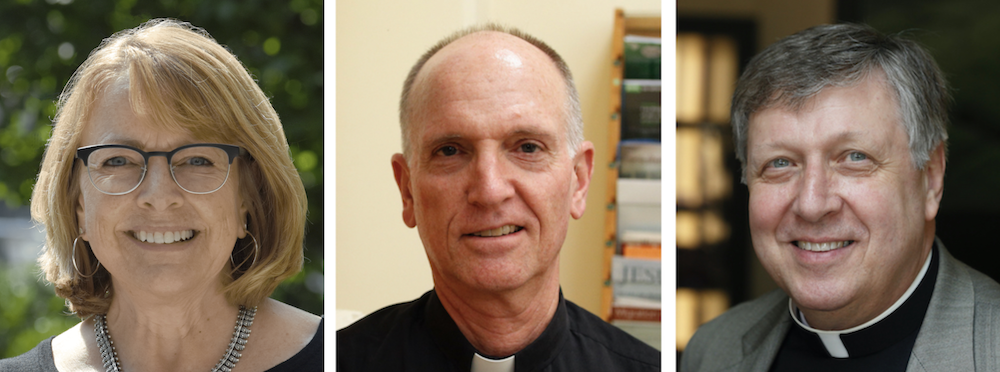
Joan Rosenhauer, executive director of Jesuit Refugee Service USA (Courtesy of JRS USA); Jesuit Fr. Tom Smolich, international director for Jesuit Refugee Service (CNS/Paul Haring); Fr. Larry Snyder, vice president for mission at the University of St. Thomas in St. Paul, Minnesota, and former president of Catholic Charities USA (CNS/Paul Haring)
Mission, innovation, smart choices
Jesuit Fr. Tom Smolich is the international director for Jesuit Refugee Service.
The COVID-19 pandemic will not bring the 70-plus million forcibly displaced people in our world home. COVID-19 cannot derail the church's mission of dignity and full human life for our refugee sisters and brothers. Yet the post-COVID church needs a depth and breadth to engage the five to 10 years of change arriving now. This rapid evolution presents three challenges:
Mission renewed: Like Lazarus leaving the tomb, life post-COVID will be different. Whether global solidarity or self-interest will be dominant is not certain; how can our church assure the outcome? JRS's strategic priorities include reconciliation, connecting and reconnecting refugees and host communities through faith values and shared projects. Rebuilding the world after social isolation requires solidarity and reconciliation.
Innovation required: COVID-19 recovery will require innovation, new ways inspired by the Gospel to serve others. In addition to technology, there is the human side of innovation: improved health standards in projects, changes in educational curricula, deeper empowerment of women and girls for the post-COVID world. Innovation builds on community and technology, and we must keep both in the picture.
Smart choices to make: Work with vulnerable migrants will have to change, and financial resources will recover slowly; this will be hard. How can we be of greatest service? Can all once-thriving projects survive? We have to find a path between nostalgia and hyper-efficiency; we will need a spirit of discernment for the difficult choices to come.
Into the post-COVID world, Isaiah invites us: "Behold, I am doing a new thing; now it springs forth, do you not perceive it?" (43:19).
A reminder to 'see' those in need
Fr. Larry Snyder is the vice president for mission at the University of St. Thomas in St. Paul, Minnesota. He was the president of Catholic Charities USA from 2004 until 2015.
I believe the church's social ministry is intricately entwined with her sacramentality. Signs and symbols represent deeper realities that define our relationship to God and who we are called to be as faithful disciples. When persons of faith perform acts of mercy, it is a sign, an expression of their faith.
In his 2005 encyclical Deus caritas est ("God is love"), Pope Benedict XVI tells us that the three duties of the church are to preach the Gospel, to celebrate the sacraments and to live lives of service through acts of charity. None of these is negotiable.
So, at a time of global pandemic when people are required to maintain social distance, how do we actualize those three demands? While the inability to gather as a community of faith is distressing, we have virtual options that at least permit us to make space in our day for prayer and spiritual connection.
But how do we practice social ministry when many of us are sheltering in place? There are those who will continue to feed the hungry and shelter the homeless because it is their profession. Some will continue to volunteer as the situation allows. We can support them through prayer, but also through almsgiving upon which their services depend. And we can stand in solidarity with the poor by holding them in our hearts.
But the true challenge will come after the coronavirus threat is ended. It will not be easy to leave the message of social isolation behind. Unfortunately, we may have become accustomed to seeing the "other" as a threat.
I think we will embrace our spiritual homes, our parishes, stronger than we did before. But I fear we might not be so quick to volunteer or associate with the poor, the disadvantaged, the marginalized. Pope Francis tells us of the importance of "seeing" the needy; Mother Teresa reminds us that in the faces of the poor we see the face of Christ.
Those with the responsibility of preaching will need to remind us all of that. There is no moratorium on our Gospel responsibilities.
[Heidi Schlumpf is NCR's national correspondent; Michael Sean Winters is a longtime NCR columnist; Joshua J. McElwee is NCR's Vatican correspondent.]







